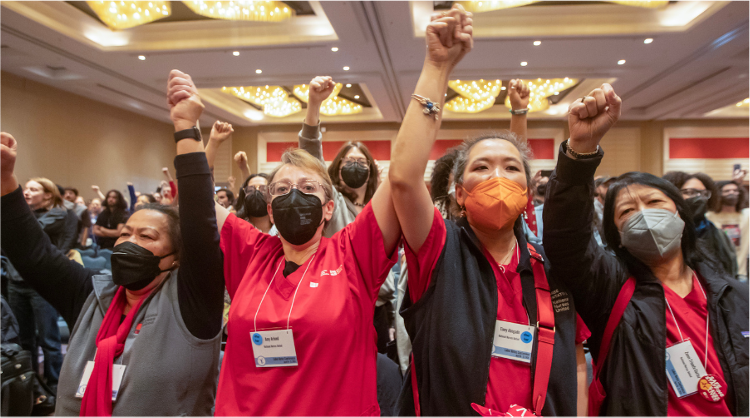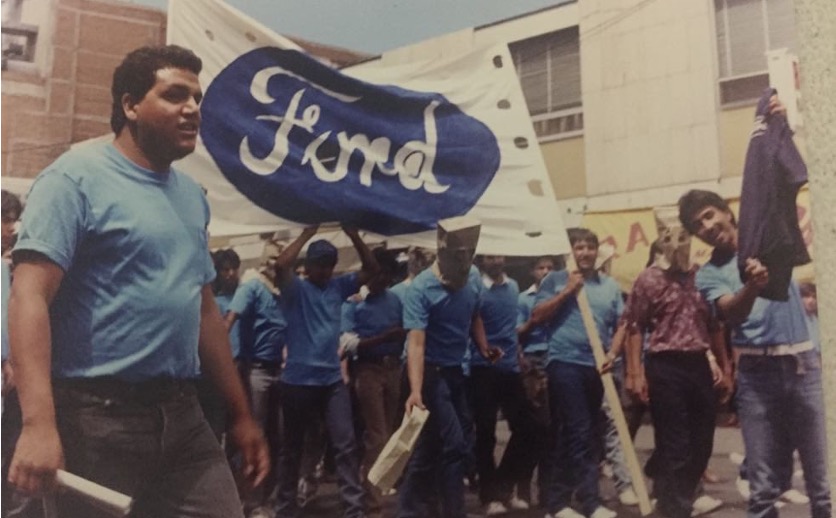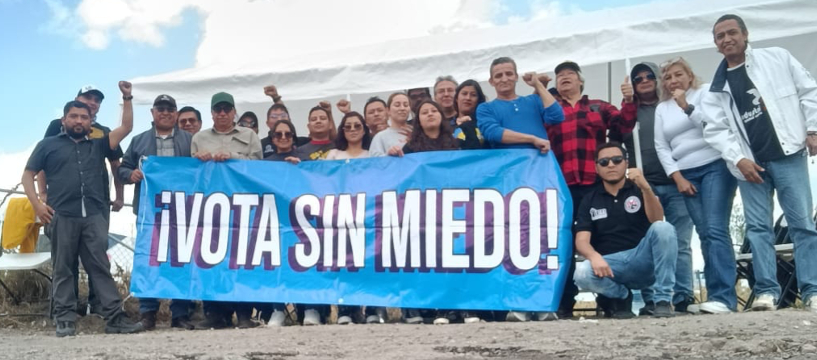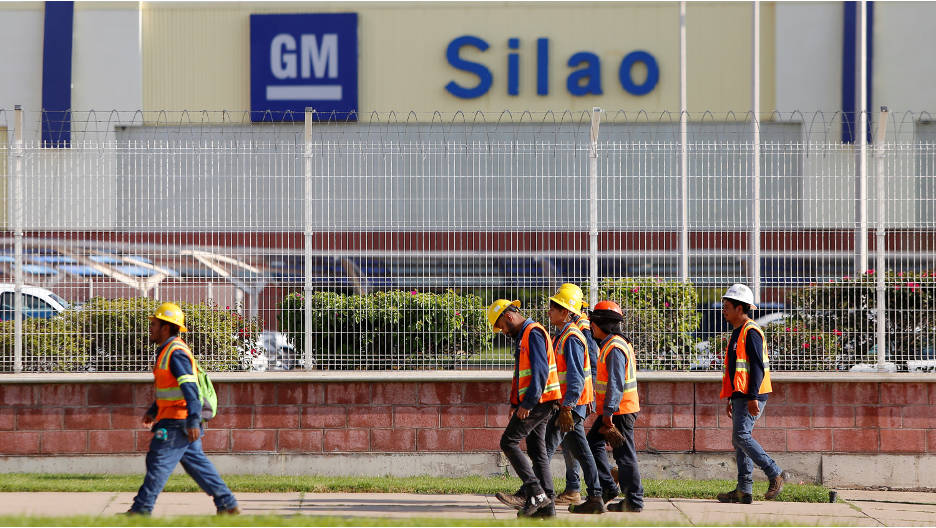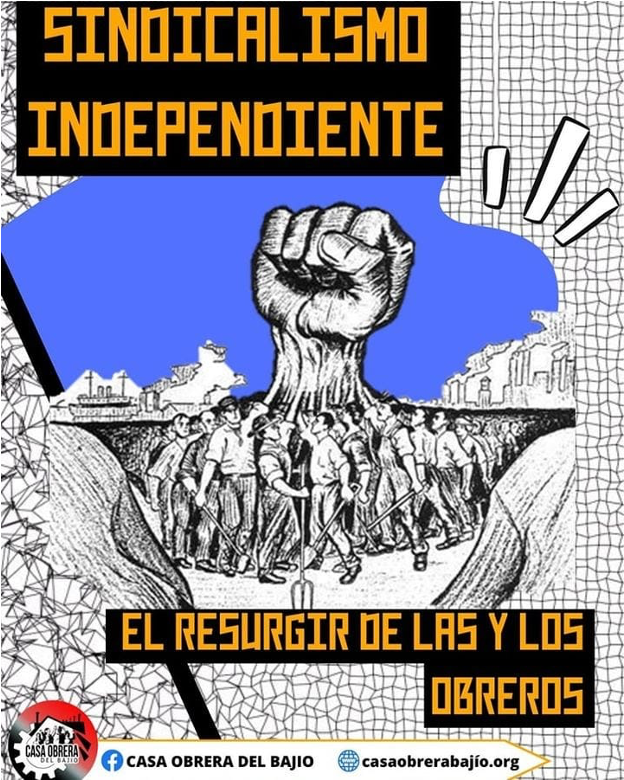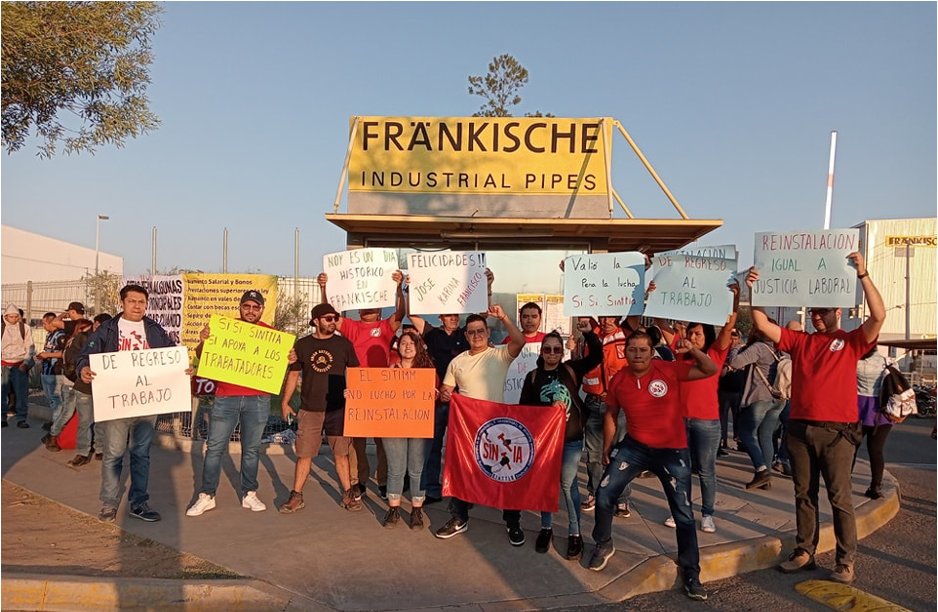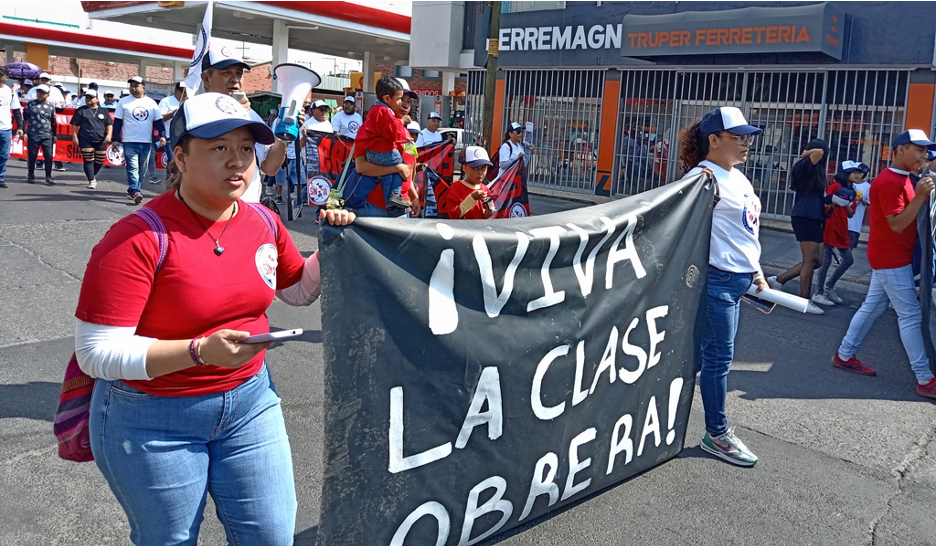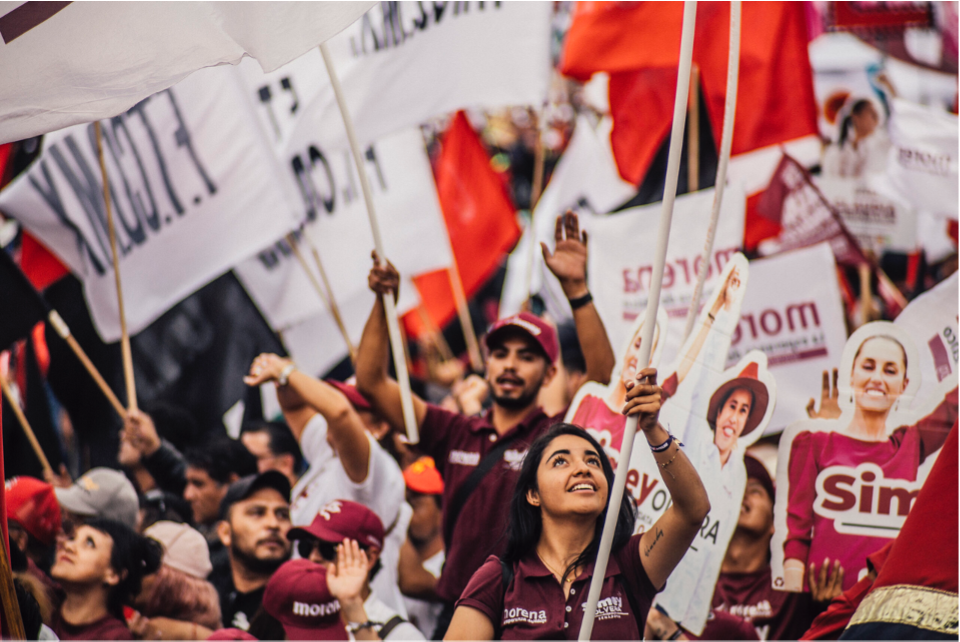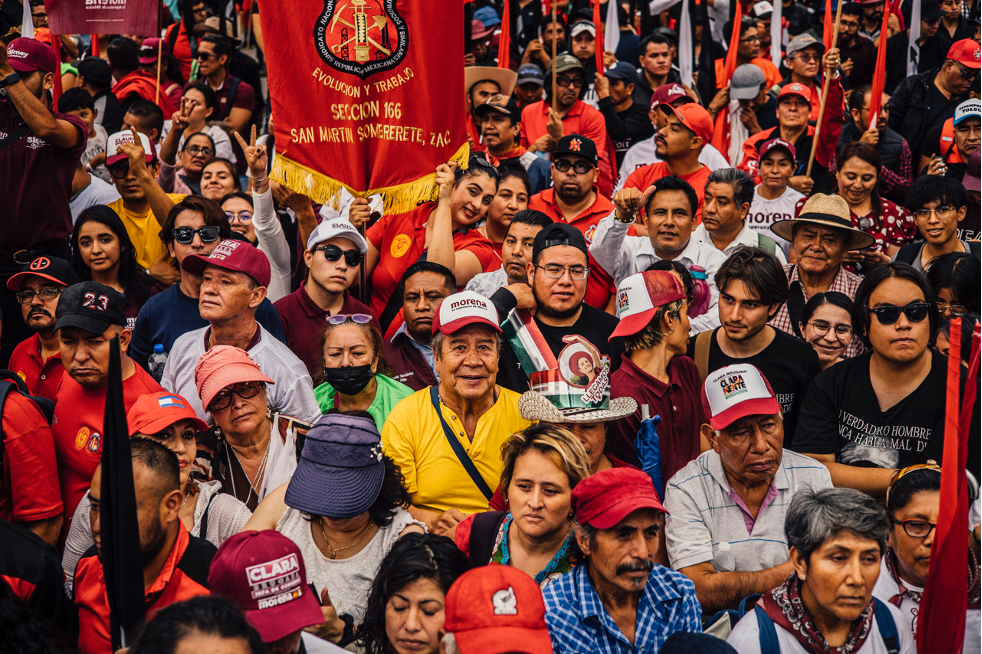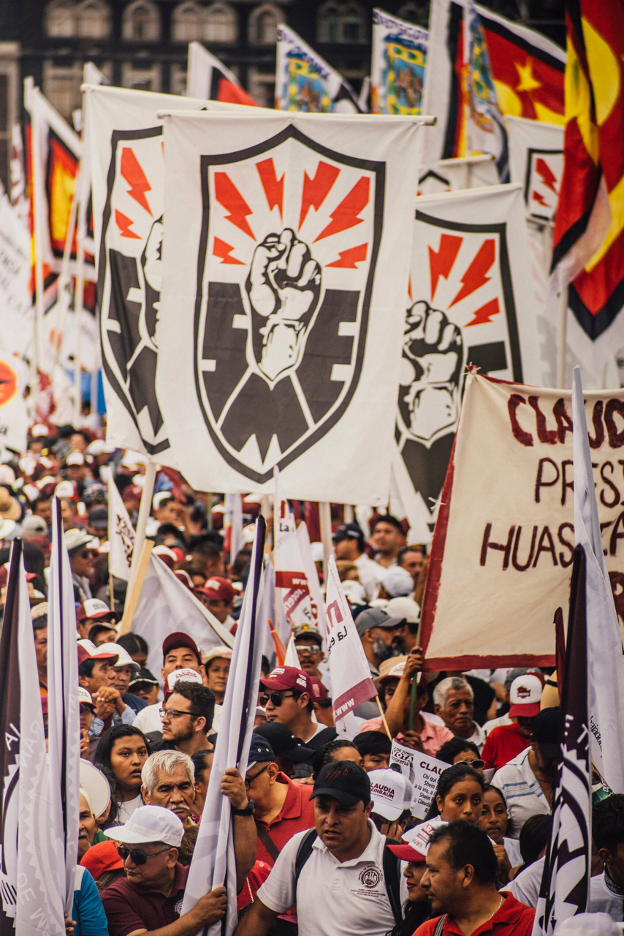|
|
|
|
The weekly newsletter of the Mexico Solidarity Project |
|
June 5, 2024 |
|
Every issue archived online at mexicosolidarityproject.org |
|
|
|
BREAKING NEWS!!! Hooray for Claudia Scheinbaum, who won Mexico's presidential election by a landslide, with over 70% of the people voting. The Mexican people have spoken. Tune in to next week's Bulletin for more results! |
|
Labor Notes 2024: Global Troublemakers |
|
Meizhu Lui, for the editorial team |
|
|
In April 2024, for three intense days, 4700 radical and committed rank-and-file union activists converged in Chicago at the biannual Labor Notes Conference. Yes, you heard right. 4700! With a waiting list of thousands more. The turnout itself illustrated the excitement, enthusiasm and thirst for connection with like-minded workers that so many feel today.
We’re not just talking about US workers. Labor Notes took special pains to ensure that workers from all parts of the world participated. We paid rapt attention as Chinese, German, Italian workers — and more — shared information about their working conditions at home. We learned how these “troublemakers” have devised creative strategies to improve them, often under repressive conditions.
This year, Labor Notes prioritized Mexican workers, and got 16 Mexican workers to the conference. A few had problems getting US visas, and Labor Notes provided administrative and financial help. Apparently, every Mexican seeking entry is viewed as potentially an illegal immigrant! Several workshops were devoted to Mexican labor, and Hector de la Cueva, whom we interviewed recently, spoke at one of them.
In his remarks, he observed that a union in each plant is good — but not good enough. For real working-class power, we must go further. The working class hymn “Solidarity Forever” asks, “What force on earth is weaker than the feeble strength of one?” We need the strength of many plants united across entire industries — and across national borders. The Labor Notes conference ended with the huge auditorium reverberating with the passion of thousands of voices: “There can be no power greater anywhere beneath the sun. For the union makes us strong!”
The working-class has been a sleeping giant. At Labor Notes, we felt the giant stirring. In the US, in Mexico and around the world, good trouble is brewing! |
|
For a deeper dive into current news and analysis in English, check out our media website. And tune into ¡Soberanía! (Sovereignty) with José Luis Granados Ceja and Kurt Hackbarth. They entertain, while dismantling the lies and distortions about Mexico fed to us by the mainstream media. |
|
Don’t miss an issue! Sign up for a free Mexico Solidarity Bulletin subscription. |
|
|
ERRATA: In last week's issue, May 29, 2024, we neglected to credit the bio photo for the Voices column, Getting to “Yes” to Migrants. It was Mike McKisson's photo used for John Washington's headshot. Thank you Mike! |
|
The Challenges of Mexico's Labor Reform |
|
Hector de la Cueva, the long-time general coordinator of CILAS (Center for Labor Research and Advocacy), has for four decades been a tireless supporter of workers struggling to get out from under the corrupt company unions. With new openings for independent organizing, CILAS has created several Casas Obreras (worker centers) and redoubled its efforts to provide rank-and-file workers with the information and skills needed for what will remain uphill battles. |
|
|
For decades, workers have tried to organize into democratic unions to change dismal conditions. You participated in such an effort at Ford in 1990, which was crushed by goons. What was going on?
The party in power for 70 years, the PRI, had complete control over labor. The government, employers and the unions they created used intimidation, firings and violence, including shootings, to repress worker insurgencies. Gunfights even broke out between groups that both wanted to represent the workers at a particular plant; there was money in it! Despite a pro-labor constitution, it was almost impossible to form an independent union. |
|
|
Jan. 11, 1990 rally at the Ford Plant after the shooting at the occupied plant Photo: Jamie Flores Duran |
|
The 1970s saw a moment of major social upheaval, influenced by the left. Students and workers rose up, and a few independent unions, such as VW and Nissan, succeeded in winning the right to represent workers. But after the 1980s and the beginning of neoliberalism, the window closed. |
|
We had three kinds of unions. First, the “yellow” unions, which were linked to the PRI, the CTM and the Labor Congress, which was created in 1967 as the umbrella for all of them. Second, the “white” unions, which were created by the employers themselves. Third, the “protection” unions, which were straight-out mafia organizations. Gangsters sold their services in neighborhoods to “protect” local businesses; well, this was the same thing on a larger scale, only they were selling protection from the company’s own workers.
While the “yellow” unions did negotiate worker contracts, the white and protection unions did not. The right-wing PAN party, which won the presidency in 2000, promoted this third kind of “ghost” union. After that, even the yellow unions changed their business model and turned to protection unions. It got worse for worker organizing.
In 2019, under the president Lopez Obrador, Mexico completely reformed its labor system to enforce workers’ right to organize. Did it succeed?
The labor reform required that every contract be legitimated — voted to be accepted — by a company’s workers by July 2023. Out of 500,000 contracts, about 370,000 were pretend contracts made by fake “ghost” unions, so these were annulled. Of the remaining 130,000, 100,000 didn’t organize a vote, so those contracts expired. |
|
|
“Vote without Fear!” Photo: Casa Obrera del Bajîo |
|
That left 30,000. The process used in most cases is what we call “simulated consultation,” where the process looked like an election, but since the yellow union itself organized the vote, the conflict of interest led to fraud. The new Mexican labor department approved these contracts and the representation of the company unions! So, most unions are still in the hands of the corrupt old guard.
The new labor department personnel, including its secretary, Luisa Maria Alcalde, didn’t come from a militant labor tradition; they were liberals, not leftists. The mantra was “peace,” which meant that they formed good relations with the bad guys too, including the old CTM.
Of course, it’s hard to change an entire labor system in a few years. We didn’t have enough labor inspectors for millions of workers, and the new judges in the labor tribunals had no experience with labor issues. We had no history of independent unionism to draw personnel and practices from. But with that said, I feel the labor department didn’t intend to democratize labor. I didn’t see enough effort, enough commitment.
In the free trade agreement, the USMCA (T-MEC), new labor protections were negotiated in 2018. Have those been successful?
The Rapid Response Mechanism (RRM), where Mexican workers can file a direct complaint with the US Department of Labor and the US Trade Representative, has played a positive role. The US agencies have been supportive of worker claims of interference by companies and the unions imposed on them as they attempt to exercise their right to organize. The first RRM complaint they acted on was at General Motors in Silao, and it opened the way for a groundbreaking victory for SINTTIA. Other RRMs also forced fair elections, resulting in wins for independent unions. |
|
But the problem is that without an RRM complaint, chances of an independent union victory are small. At the Mexican level, we have no rapid response mechanisms, so intimidation and fraud continue as before. We don’t need more reform. We need the government to enforce the laws we have. |
|
|
Workers outside the General Motors plant in Silao, Mexico:Reuters |
|
We’ve seen a number of new independent unions since 2019 — and we’ve already seen some internal conflicts. What’s going on? |
|
|
Independent unionism, the resurgence of workers, poster: Casa Obrera del Bajîo |
|
The new unions have varying origins. SINTTIA, first formed at GM Silao, emerged from a rank-and-file struggle. La Liga came from the US Solidarity Centers, the international arm of the AFL-CIO. It was just a name at first, but then they succeeded in organizing workers at 3M and Goodyear Tire. In Tamaulipas, a spontaneous strike in the maquiladora sector was taken over by the lawyer Susan Prieto. “Her” union, SNITIS, is not worker-led or worker-run. This type of leadership — control by a lawyer — is manipulative, and I see it as a cancer in the labor movement. |
|
But problems within the new unions are natural. Democracy means differences, and friends fight each other. Also, the new leaders find that leading is different from being in opposition. A new set of skills, a new mindset is necessary.
A bigger problem I see is that we cannot have a different union in every plant; that’s not how to win power. Independent unions form in reaction to the old company unions, but they need a common strategy. We need unions that organize entire companies, or even better, whole sectors, as the UAW has done in the US. |
|
We do have union coalitions; for example, we have the FESIIAAAN (Federation of Independent Unions of the Automobile, Auto Parts, Aerospace, and Tire Industries), but it lacks consistency in leadership and strategy. I have hope for SINTTIA. It is not a plant union. It is a national union that is organizing new factories. In time, it’s possible that it can develop into an anchor for FESIIAAAN. |
|
|
Auto parts company Fränkische joins SINTTIA: Casa Obrera del Bajîo |
|
In 2020, workers at GM Silao organized solidarity actions to support striking UAW US workers. Mexican workers seem more aware of the need for international solidarity than US workers. Why is that? |
|
|
Poster: Casa Obrera de Tlaxcala |
|
Mexican workers have learned the importance of international solidarity because they see that it works. At GM Silao in 2021, SINTTIA had union support from Brazil, the US, Canada, and other countries. That put pressure on GM, a global company. And today, it is easier than ever before to build alliances over long distances.
While the capitalists want to enforce borders that workers can’t cross, we are showing that yes, we can! Through communication, cooperation, and organization, working-class power can jump over borders. |
|
|
SINTTIA marches on MayDay, “Long live the working class!” Photo: Casa Obrera del Bajîa |
|
|
|
|
“Let’s Keep Making History” — and Herstory! |
|
|
Jay Watts, a Canadian photojournalist specializing in social movements and the left, is now based in Mexico City. His work has appeared in the Toronto Star, Maclean’s, De Raíz, TV Azteca, Canadian Geographic, Canadian Dimension, and People’s Voice — and he’s the webmaster for the Mexico Solidarity Media website, where you can see more photos. |
|
Excerpted and translated by Jay Watts from La Jornada, Alma Muñoz and Alonso Urrutia, May 20, 2024. |
|
|
|
On Wednesday, May 29, before a full Zócalo in Mexico City, the candidate of the Let’s Keep Making History coalition, Dr. Claudia Sheinbaum, pledged to “give my soul, my life and the best of myself for the well-being of the people of Mexico, the dignity of the Republic and the country. I commit to preserving the legacy of President Andrés Manuel López Obrador, I commit to being a good president who lives up to the greatness of our history and the greatness of our people.” |
|
|
The Electrical Workers Union of Mexico was there! |
|
|
Sheinbaum urged her audience to return this Sunday night to celebrate the triumph of the movement, just as they did six years ago with President Andrés Manuel López Obrador.
“We will maintain the obligatory division between economic and political power. We will not submit to any foreign economic power, no matter how powerful it may be. We will always defend and transform the country.” |
|
|
|
|
Recent news reports and commentaries, from progressive and mainstream media, |
|
Kurt Hackbarth, Claudia Sheinbaum’s Victory Is a Triumph for Mexico Jacobin. Claudia Sheinbaum has won Mexico’s presidential election in a landslide. In her victory speech, she paid homage to the social movements of the past and promised to continue MORENA’s impressive record of social progress, writes Kurt Hackbarth of Mexico Solidarity Media.
Alma E. Muñoz y Carolina Gómez, Presidenta La Jornada. En su primer mensaje como virtual presidenta electa, Claudia Sheinbaum aseguró que estará a la altura de “nuestra historia y del generoso pueblo de México”.
José Luis Granados Ceja, Leftist Claudia Sheinbaum Wins Landslide Victory in Mexico Presidential Election Truthout. Mexico’s first woman president faces an uneasy road after opponents falsely accuse Morena party of authoritarianism, writes José Luis Granados Ceja of Mexico Solidarity Media.
Viri Ríos, El mensaje de la elección 2024 Milenio. Los ideólogos de la transición defienden y siempre han defendido una democracia procedimental, que, en los hechos, era una farsa. Que era una cruel dictadura contra los pobres con instituciones autónomas fabulosas.
Alejandra Garcia, Mexico-Guatemala: A Border that Won’t be Divided Resumen Latinoamericano. In a historic meeting held in the city of Tapachula, Chiapas in mid-May, Mexican President Manuel López Obrador and Guatemalan President Bernardo Arévalo sealed commitments to mutual aid and to build a border that “does not separate” the two countries.
Kurt Hackbarth, Política exterior para el segundo piso Sentido Común. Evadir responsabilidad con una versión de que “la mejor política exterior es la interior” no va a ser suficiente en el sexenio por llegar.
Morena’s Clara Brugada Wins Head of Government in Mexico City Telesur English. The left-winger candidate and creator of Iztapalapa’s famed Utopias will rule in the CDMX for the next six years.
Antonio María Calera-Grobet, La democracia según el otro Sin Embargo. Un grupo de pensadores y escritores, ciudadanos al fin y al cabo, de distintas edades y oficios responden sobre la democracia.
Evo Morales Praises Profound Changes Promoted by AMLO in Mexico Telesur English. The Bolivian politician assured López Obrador there was "a resounding change in Mexico and that strengthens Latin American integration."
Georgina Zerega y Beatriz Guillén, Clara Brugada, la feminista de los barrios pobres que gobernará Ciudad de México El País. La candidata del oficialismo ha dedicado más de tres décadas a trabajar por la ciudad. Economista de formación, la favorita del ala dura de Morena ha forjado su carrera en el activismo. |
|
|
|
|
The Mexico Solidarity Project brings together activists from various socialist and left organizations and individuals committed to worker and global justice. We see the 2018 election of Andrés Manuel López Obrador as president of Mexico as a watershed moment. AMLO and his progressive Morena party aim to end generations of corruption, impoverishment, and subservience to US interests. Our Project supports not just Morena, but all Mexicans struggling for basic rights, and opposes US efforts to undermine organizing and Mexico’s national sovereignty.
Editorial committee: Meizhu Lui, Bruce Hobson, Agatha Hinman, Victoria Hamlin, Courtney Childs, Susan Weiss. To give feedback or get involved yourself, please email us! |
|
Subscribe! Get the Mexico Solidarity Bulletin in your email box every week. |
|
Web page and application support for the Mexico Solidarity Project from NOVA Web Development, a democratically run, worker-owned and operated cooperative focused on developing free software tools for progressive organizations. |

